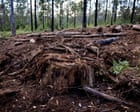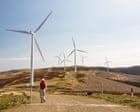Temperatures in the North Pole on Sunday reached 20 degrees Celsius above the average set between 1991 and 2020, after reaching 18 degrees higher than the average on Saturday.
With the rise, the temperature in the North Pole surpassed the point of freezing, or 0 degrees Celsius. One reading measured the temperature at 0.5 degrees Celsius, and the EU Copernicus Climate Change Service measured temperatures above -1 degree Celsius as far up as the 87th parallel in the Arctic.
“This was a very extreme winter warming event,” Mika Rantanen, a scientist at the Finnish Meteorological Institute, told The Guardian. “Probably not the most extreme ever observed, but still at the upper edge of what can happen in the Arctic.”
According to Rantanen, the temperature could be between 20 to 30 degrees Celsius warmer than average, but the exact difference is difficult to judge in such a remote location.
“This was a very extreme winter warming event,” said Mika Rantanen, a scientist at the Finnish Meteorological Institute. “Probably not the most extreme ever observed, but still at the upper edge of what can happen in the Arctic.”
#Arctic @mikarantane.bsky.social
— Aarne Granlund (@aarnegranlund.bsky.social) February 4, 2025 at 1:53 PM
EU Copernicus Climate Change Service scientist Julien Nicolas told The Guardian that warmer air was flowing toward the North Pole because of a low-pressure system over Iceland as well as rising ocean temperatures in the Atlantic.
A study by Rantanen and colleagues published in 2022 found that the Arctic has been warming much faster than the rest of the world, an event known as Arctic amplification. Data and modelling revealed that the Arctic could be warming as much as four times faster than the rest of the world. The study authors noted that some areas within the Arctic are even warming up to seven times faster than the pace of average global warming.
According to data from the EU Copernicus Climate Change Service, the Arctic has warmed by around 3.3 degrees Celsius since pre-industrial times, compared to about 1.3 degrees Celsius of warming globally.
The rapidly increasing temperatures of the Arctic, even in the winter, have scientists concerned over ice melt, rising sea levels and emissions. According to the National Snow and Ice Data Center, Arctic sea ice has been decreasing at a pace of 13% per decade since 1979.
A 2023 study, co-authored by Dirk Notz, a climate scientist at the University of Hamburg, determined that the Arctic could experience completely ice-free summers, even in low emissions scenarios, as soon as the 2030s.
“There is no negotiating with this fact, and no negotiating with the fact that the ice will disappear more and more as long as temperatures keep rising,” Notz told The Guardian. “We expect the Arctic Ocean to lose its sea-ice cover in summer for the first time over the next two decades. This will probably be the first landscape that disappears because of human activities, indicating yet again how powerful we humans have become in shaping the face of our planet.”
Already, the rising temperatures have lead the Arctic to become a source of carbon emissions, rather than a carbon sink, for the first time in 2024, according to a recent report from the United States National Oceanic and Atmospheric Administration (NOAA).
These problems are mirrored in the Antarctic, which recently reached alarmingly low ice levels and a heat wave, with temperatures over 10 degrees Celsius higher than average, over the Southern Hemisphere’s winter of 2024.
The post North Pole Temperature Reaches 20°C Above Average appeared first on EcoWatch.






